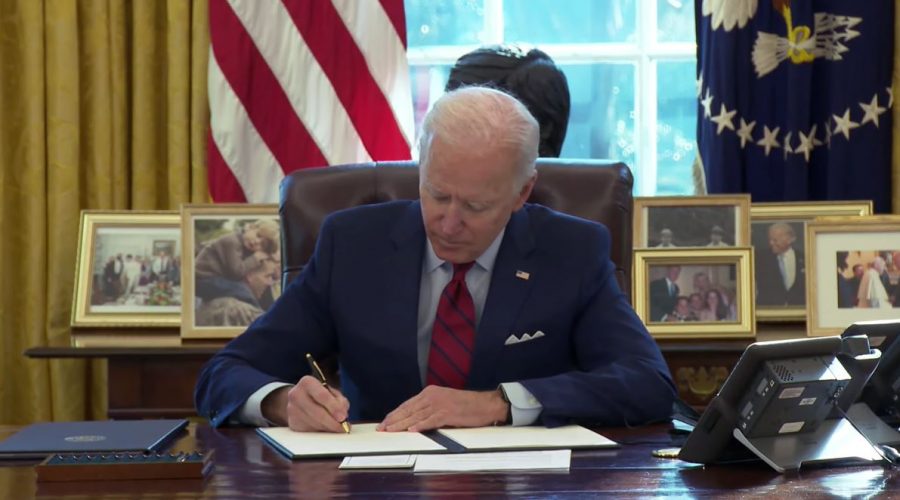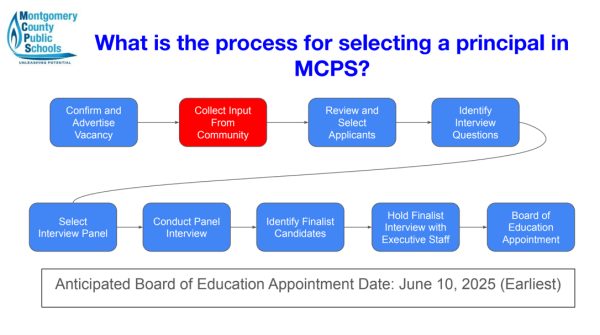Biden implements executive orders to counter Trump’s policy, meets with mild controversy
Photo used with permission from Google Commons
President Joe Biden signs “Executive Order on Strengthening Medicaid and the Affordable Care Act” at the White House on Jan. 28.
Since his election in 2021, President Joe Biden has signed an enormous number of executive orders, memorandums, actions and notices, 20 of which, according to CNN, have been direct reversals of Donald Trump’s policies and executive orders. Most of these reversals have been focused on the most contentious topics of Trump’s presidency, including the COVID-19 pandemic, immigration policy, and environmental issues. The purpose of an executive order is to help the president enforce existing law; executive orders do not require Congressional approval to pass, and can be overthrown not by Congress but by the Supreme Court.
To address the issues of the pandemic, Biden has appointed Jeffrey D. Zients, former head of the National Economic Council under the Obama administration, as the COVID-19 response coordinator, and reinstated the directorate for global health in the National Security Council, reversing former President Trump’s previous decision, and rejoining the World Health Organization. Other executive orders have sped up the process of manufacturing vaccines, required masks to be worn in airports, trains, buses and various other methods of transportation, established a National Pandemic Testing Board to expand testing throughout the U.S., instated a federal moratorium on evictions, and restored the directorate for global health security and biodefense at the National Security Council, a group Trump had disbanded. “There’s a lot of talk with good reason about the number of executive orders that I’ve signed. I’m not making new law. I’m eliminating bad policy,” Biden said.
With regards to immigration, Biden has used a memorandum to call for “[p]reserving and [f]ortifying” the Deferred Action for Childhood Arrivals (DACA) program, which protected immigrants taken to the U.S. as children. He has also reversed the travel ban on multiple nations in the Middle East instated by Trump, reversed his executive order removing funds for cities with policies of Sanctuary cities that protect undocumented immigrants from deportation, and issued a proclamation halting construction of the border wall. “There is no time to waste when it comes to tackling the crises we face. That’s why today, I am heading to the Oval Office to get right to work delivering bold action and immediate relief for American families,” Biden said.
Biden has also reinstated the U.S.’ allegiance to the Paris climate accord, and according to the New York Times, has tasked federal agencies with trying to reverse Trump’s environmental policies, focusing on issues raised by the Environmental Protection Agency (EPA). According to Gina McCarthy, Biden’s national climate adviser, these efforts were intended to “begin undoing some of the harmful actions that happened in the previous administration’s watch, so that we can move forward in combating the climate crisis.” Biden also revoked the permit for the Keystone XL pipeline for pumping crude oil from Canada to the U.S..
Supporters argue that the orders are well-formulated and present positive changes in the United States. “If you look at the orders, the language of the orders and what they’re actually calling for by the agencies seem to be very measured. Although they are in very controversial topics in some cases, you’re not seeing anything in there that’s substantively all that dramatic,” Philip Cooper, a government professor at Portland State University, said.
Critics have argued that the move will be ineffective in the long run. The Editorial Board of The New York Times argued that Biden’s moves were short-sighted and that true, lasting change would depend on action through Congress, not executive orders alone, writing, “[t]hese directives, however, are a flawed substitute for legislation. Executive actions are far more ephemeral and easily discarded than legislation, which can set up a whipsaw effect, as each president scrambles to undo the work of his predecessor. It is long past time for Congress to establish a clearer, more permanent path for them.”
Your donation will support the student journalists of Thomas S. Wootton High School. Your contribution will allow us to purchase equipment and cover our annual website hosting costs.
Elliot Wang is a 2021 graduate.







